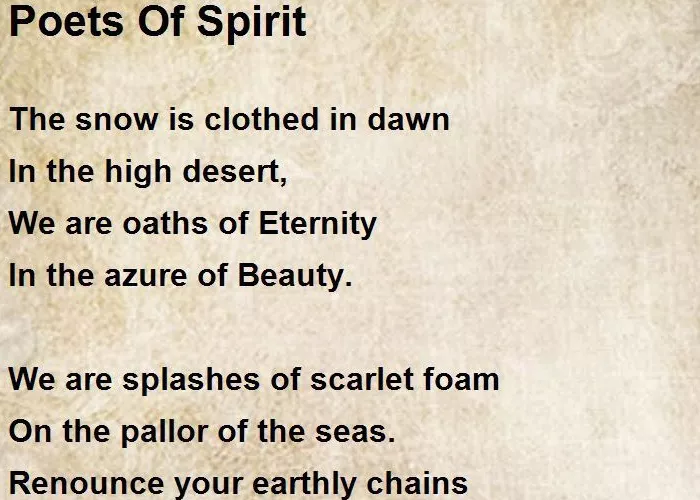Welcome to Poem of the Day – Poets of Spirit by Vyacheslav Ivanovich Ivanov.
Vyacheslav Ivanovich Ivanov, a towering figure of the Russian Symbolist movement, stands as a poet-philosopher whose works resonate with metaphysical depth and spiritual yearning. Among his many contributions, Poets of Spirit (1906) is a seminal essay that illuminates his poetic philosophy and the transcendental nature of Symbolist art. Ivanov’s essay serves not only as a manifesto for Symbolism but also as a reflection on the spiritual mission of the poet.
Poets Of Spirit Poem
The snow is clothed in dawn
In the high desert,
We are oaths of Eternity
In the azure of Beauty.
We are splashes of scarlet foam
On the pallor of the seas.
Renounce your earthly chains
To sit among the kings!
Don’t imagine we are dissolving in the sky,
Cut off from the earth: –
A holy path leads
Beyond the clouds into dreams.
Poets Of Spirit Poem Explanation
Ivanov viewed poetry as more than an aesthetic exercise; for him, it was a sacred act, a conduit to the divine. In Poets of Spirit, Ivanov argues that poets must transcend the material and the mundane, venturing into the metaphysical to unveil eternal truths. He posits that a true poet is not merely a creator of beautiful verse but a visionary—a mediator between the human and the divine. This philosophy aligns closely with the overarching principles of Symbolism, which sought to express the ineffable through the interplay of symbols, sounds, and mystical imagery.
Ivanov’s essay draws heavily on his understanding of classical philosophy, Christian theology, and mystical traditions. He invokes the ancient Greek concept of the “Logos,” linking it to the poet’s duty to articulate the divine word. For Ivanov, the poet becomes a modern incarnation of the seer, tasked with revealing spiritual realities hidden beneath the surface of the everyday.
The Poetic Spirit and Collective Consciousness
One of the key themes in Poets of Spirit is Ivanov’s belief in the communal and redemptive role of the poet. He sees poetry as a means to unify humanity by tapping into a collective consciousness. Ivanov’s work frequently references Dionysian rites, where art and ritual dissolved individual boundaries, creating a shared experience of transcendence. In this sense, the poet’s spirit is not solitary but inherently communal, calling others into a collective journey toward spiritual enlightenment.
This idea aligns with Ivanov’s emphasis on the universality of symbols. Symbols, in his view, possess a transcendent quality that speaks to the shared human experience. By employing archetypal imagery—light, darkness, the sea, the divine—the poet can evoke emotions and insights that resonate across cultures and epochs.
A Poetics of Ascent
Ivanov’s notion of poetry as an ascent is central to Poets of Spirit. He portrays the poet as a spiritual pilgrim, constantly striving toward the heights of divine knowledge. This journey, however, is not without struggle. Ivanov acknowledges the tension between the earthly and the divine, suggesting that the poet must grapple with their human limitations to reach spiritual insight.
The essay often contrasts the horizontal movement of earthly concerns with the vertical aspiration toward the divine. For Ivanov, poetic creation mirrors this ascent. Each word, symbol, and metaphor becomes a step on the ladder of transcendence, inviting both the poet and the reader to partake in the sacred climb.
The Poet as a Prophet
Ivanov’s essay casts the poet in a prophetic role, one that carries both privilege and responsibility. The poet-prophet, in his vision, is attuned to the whispers of the divine and must convey these revelations to the world. This prophetic function often involves suffering, as the poet is caught between the imperfect realities of human existence and the divine perfection they seek to articulate. Ivanov’s own poetic works, infused with themes of martyrdom and sacrifice, reflect this duality.
In Poets of Spirit, Ivanov cites the works of predecessors and contemporaries who embody this prophetic ideal, including Dante, Goethe, and his fellow Symbolists. These figures, he suggests, have glimpsed the eternal and returned to their societies with visions of hope, warning, and redemption.
Legacy and Influence
Poets of Spirit cemented Ivanov’s reputation as a key theorist of Russian Symbolism. His ideas about the spiritual nature of poetry influenced not only his peers but also later generations of poets and thinkers. The essay’s emphasis on the metaphysical purpose of art continues to resonate, particularly in discussions about the intersection of literature, spirituality, and philosophy.
While rooted in the Symbolist movement, Ivanov’s insights transcend their historical context. His vision of the poet as a seeker of truth and a mediator of divine wisdom remains relevant in an era where art often grapples with questions of meaning and transcendence.
Conclusion
In Poets of Spirit, Vyacheslav Ivanov elevates poetry to a sacred act of spiritual exploration. His essay is a profound meditation on the poet’s role as a visionary, a prophet, and a unifier of humanity. Through his rich philosophical insights and lyrical prose, Ivanov not only defines the ethos of Symbolism but also provides a timeless blueprint for understanding the spiritual dimensions of art. For Ivanov, and for us as readers, poetry becomes a bridge between worlds—a testament to the enduring power of the human spirit to reach for the divine.

